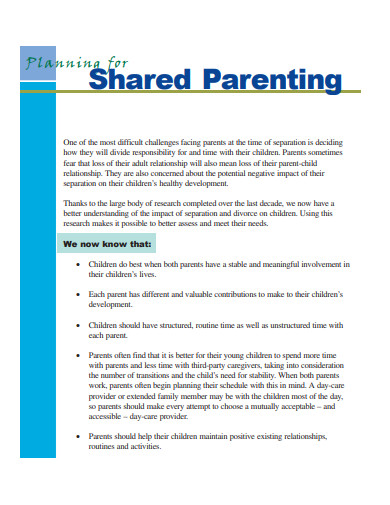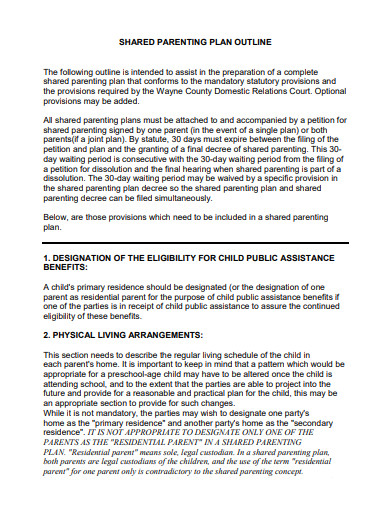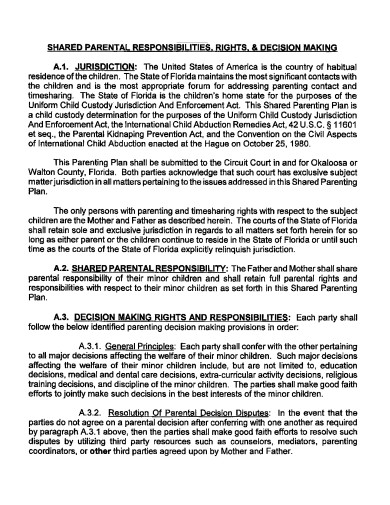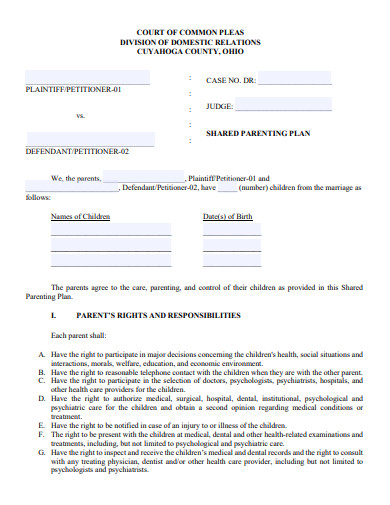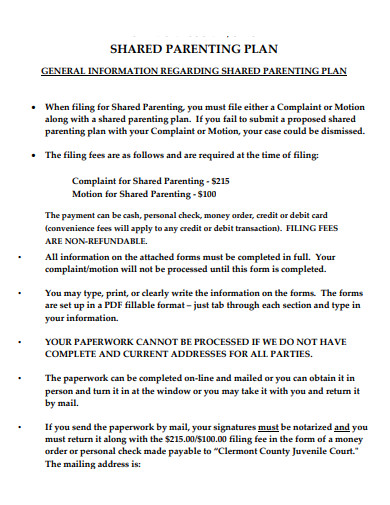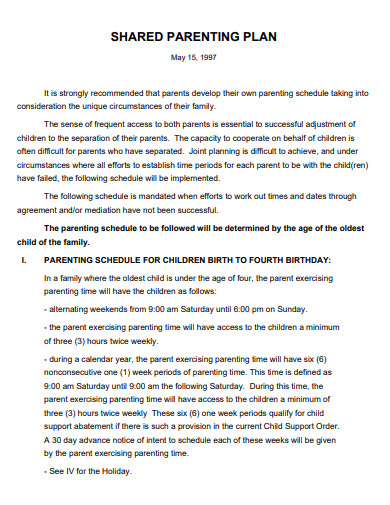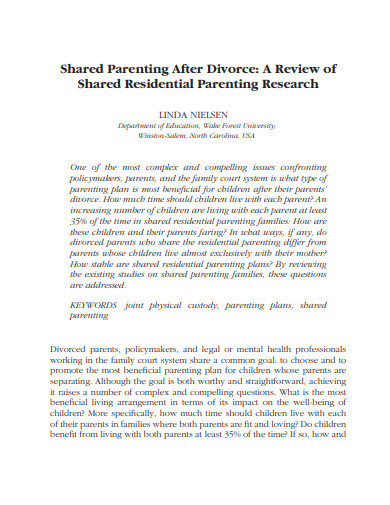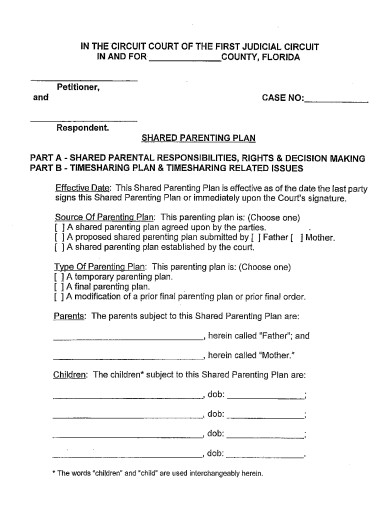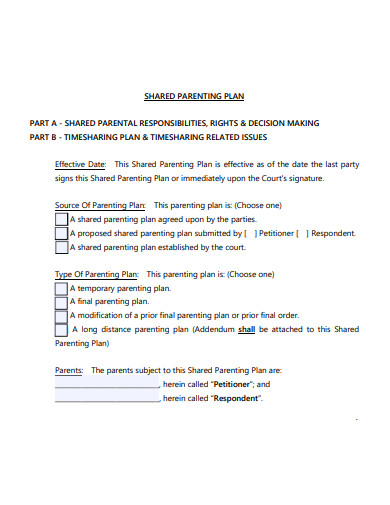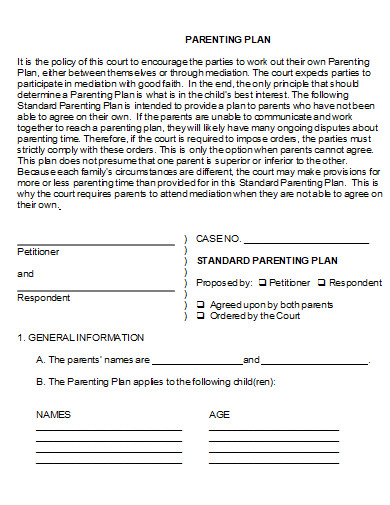Being separated or divorced from your partner can be extremely difficult especially if you have children together. Children in broken homes make it hard for them to balance their life and have conflicting feelings for each of their parents especially if both of them are not on good terms. That’s why it’s important, as much as possible, for each parent to settle their differences and try to be diplomatic with each other when they decide to raise their children together. Not only this would help heal the hurt and pain they’ve gone through with each other, but it would also give their children the opportunity to spend quality time with each parent. To do this effectively, a shared parenting plan is crucial. Read the article to know how to make a shared parenting plan.
10+ Shared Parenting Plan Samples
1. Shared Parenting Plan
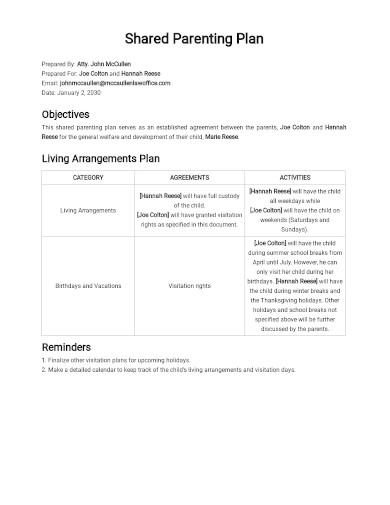
2. Sample Shared Parenting Plan
3. Shared Parenting Plan Outline
4. Simple Shared Parenting Plan
5. Court Shared Parenting Plan
6. Shared Parenting Plan Example
7. Sample Court Shared Parenting Plan
8. Shared Parenting Plan After Divorce
9. Judicial Shared Parenting Plan
10. Formal Shared Parenting Plan
11. Printable Shared Parenting Plan
What is a Shared Parenting Plan?
A shared parenting plan is a custody agreement between parents that allow their children to have equal exposure to each parent that involves more than just a few weekend outings and more of having a set schedule where the children live alternately with each parent. Some shared plans let the children live with each parent in alternating weeks or have a rotation schedule.
How to Create a Shared Parenting Plan
1. Create Instructions for Each Parent to Follow
Before you map out a plan with your ex-partner make sure to agree on the following conditions:
- Consider each idea from each other and keep the conflict level low by being open-minded to each other’s suggestions
- Clearly define each of your roles and responsibilities
- Make sure that your custody schedule is clear and detailed to avoid confusion
- Make sure your plan is realistic and flexible to accommodate any situations
- Agree to be the bigger persons and mediate on some stuff that you cannot agree on some aspect
- Make sure the plan is detailed enough to address your decisions
2. Include These Terms in Your Plan
Now is the time to split your duties and include instructions on what to do in any different scenario. Here are some examples that should be addressed clearly in your plan:
- Living arrangements
- Visitation schedule
- Child care arrangements
- Holiday and vacation time with each parent
- Children’s educational needs and goals
- Contact procedures with each parent when the children are with the other parent
- Exposure to each parent’s relatives or dating partners
- Medical care for each child
- How and when any changes to the plan should take place
- Back-up plan when either parent violates the custody agreement
- Finances for each child
- Decision-making rules
3. Help Your Child Feel Connected to Each Parent
Once you’re done creating your plan, you can print out a copy for each and keep it safe and make sure to stick to it. Sign the plan to make sure you two understand all the stipulations of your plan. While you two swore to commit to your plan, try to exert a little more effort and help your children to feel more comfortable and connected to the other parent. Don’t talk badly about your ex-partner or vent your troubles regarding your ex-partner to them. Encourage your children to send messages to the other parent when they’re with you.
Don’t forget to keep your ex-partner up-to-date with your happenings with your children by communicating with them and sharing a calendar of your visitation schedule including events. Contact your children’s school regarding your arrangement so the school can contact each parent for any concerns or emergencies.
Be more lenient and understanding of your ex-partner’s parenting style and preferences. As long as your children are safe, secure, and healthy, having different parenting approaches can help them learn that different rules apply in different situations and be more flexible in following them.
FAQs
What is the difference between joint and sole custody?
Custody means how the decisions are made by parents to their children. Joint custody means that any major decisions regarding their children must be done and agreed upon by both parents while sole custody means that only one parent makes the major decisions for their children.
What are the benefits of a shared parenting plan?
There are a lot of benefits when parents create a shared parenting plan. These benefits are:
- Creating a stable environment where children can thrive
- Reducing misunderstandings and arguments between parents
- More balanced parenting
- Forging stronger relationships between children and each parent
- Reducing the feelings of loss, rejection, and abandonment for children
Remember that your shared parenting plan will only work successfully when you and your ex-partner, as parents, can put aside your issues with each other and work together for the best interests of your children. Letting conflicts get in the way of your co-parenting can deteriorate your relationship even further and even risk the children’s wellbeing and personal relationship with you so make sure you and your ex-partner are mature enough to compromise and agree on your terms that work best for you two. If you can follow your shared parenting plan, you can work out a thriving post-divorce relationship. To help you get started making the plan, download our free sample templates above to use as your reference!
Related Posts
FREE 9+ 30-Day Marketing Plan Samples in PDF | MS Word | Apple Pages | Google Docs
FREE 3+ Sales Team Action Plan Samples in PDF | MS Word | Apple Pages | Google Docs
Marketing Plan For Small Business Samples
FREE 7+ Fashion Business Plan Samples in PDF
FREE 10+ Sprint Planning Samples In MS Word | Google Docs | PDF
FREE 10+ Wedding Planning Samples in MS Word | Apple Pages | Powerpoint | PDF
FREE 9+ Monthly Study Planner Samples in PSD | Illustrator | InDesign | PDF
FREE 9+ Sample Curriculum Planning Templates in PDF | MS Word
FREE 10+ Teacher Development Plan Samples in MS Word | Google Docs | Apple Pages | PDF
FREE 10+ Basketball Practice Plan Samples in PDF
FREE 12+ School Business Plan Samples in PDF | MS Word | Apple Pages | Google Docs
FREE 7+ Client Strategic Plan Samples in PDF | MS Word
FREE 11+ Trucking Business Plan Templates in PDF | MS Word | Google Docs | Pages
FREE 7+ Small Hotel Business Plan Samples PDF | MS Word | Apple Pages | Google Docs
FREE 14+ Bakery Business Plans in MS Word | PDF | Google Docs | Pages

